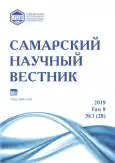Сочетание способов кодирования информации как условие эффективного формирования физических понятий в основной школе
- Авторы: Самойлов Е.А.1
-
Учреждения:
- Самарский государственный социально-педагогический университет
- Выпуск: Том 8, № 3 (2019)
- Страницы: 316-321
- Раздел: Педагогические науки
- URL: https://journal-vniispk.ru/2309-4370/article/view/34397
- DOI: https://doi.org/10.17816/snv201983315
- ID: 34397
Цитировать
Полный текст
Аннотация
В статье обсуждается способ разрешения противоречия между высокими требованиями современного Федерального государственного образовательного стандарта (ФГОС) к уровню обученности и интеллектуального развития выпускников основной школы и дефицитом эффективных дидактических средств и методик обучения, обеспечивающих усвоение школьниками абстрактных элементов учебной программы, которые ранее изучались только в звене старшей школы. Исследования российских психологов (В.Н. Дружинин, М.А. Холодная и др.) показывают, что системообразующим элементом индивидуального интеллекта являются психические понятийные структуры, причем их оптимальное становление обеспечивается совокупностью специально подготовленных учебных заданий, предполагающих использование трех модальностей опыта (чувственно-действенного, образного, знакового). На примере проектирования методики обучения электромагнитной индукции в основной школе автор показывает последовательность и специфику действий учителя, которые позволяют построить комплекс учебных заданий для полноценного обогащения умственного опыта школьников и организовать их учебную деятельность в соответствии с потребностями заказчиков школьного физического образования, с учетом психологических закономерностей становления индивидуального интеллекта, в русле современных частнодидактических подходов к управлению интеллектуальным развитием обучающихся. Предложенная методика обучения и комплекс учебных заданий, отвечающий требованиям целевой направленности, целевой достаточности, возрастания уровня трудности, мотивационной направленности, апробированы в Самарском лицее авиационного профиля № 135 и показали высокую эффективность в плане интеллектуального развития и обученности учащихся основной школы.
Ключевые слова
Полный текст
Открыть статью на сайте журналаОб авторах
Евгений Андреевич Самойлов
Самарский государственный социально-педагогический университет
Автор, ответственный за переписку.
Email: evge-samojlov@yandex.ru
доктор педагогических наук, профессор кафедры физики, математики и методики обучения
Россия, СамараСписок литературы
- Федеральный государственный образовательный стандарт основного общего образования. Утв. приказом Министерства образования и науки Рос-сийской Федерации от 17.12.2010 г. № 1897 [Электронный ресурс] // https://docs.edu.gov.ru/document/8f549a94f631319a9f7f5532748d09fa.
- Примерная основная образовательная программа образовательного учреждения. Основная школа / сост. Е.С. Савинов. М.: Просвещение, 2011. 455 с.
- Физика. 7–9 классы: рабочие программы / сост. Е.Н. Тихонова. 5-е изд., перераб. М.: Дрофа, 2015. 400 с.
- Грачев А.В., Погожев В.А., Вишнякова Е.А. Физика. 8 класс. М.: Вентана-Граф, 2018. 304 с.
- Грачев А.В., Погожев В.А., Боков П.Ю. Физика. 9 класс. М.: Вентана-Граф, 2018. 369 с.
- Перышкин А.В. Физика. 8 класс. М.: Дрофа, 2018. 237 с.
- Перышкин А.В., Гутник Е.М. Физика. 9 класс. М.: Дрофа, 2018. 319 с.
- Пурышева Н.С., Важеевская Н.Е. Физика. 8 класс. М.: Дрофа, 2018. 288 с.
- Пурышева Н.С., Важеевская Н.Е., Чаругин В.М. Физика. 9 класс. М.: Дрофа, 2018. 285 с.
- Громов С.В., Родина Н.А., Белага В.В. и др. / под ред. Ю.А. Панебратцева. Физика. 8 класс. М.: Просвещение, 2018. 304 с.
- Громов С.В., Родина Н.А., Белага В.В. и др. / под ред. Ю.А. Панебратцева. Физика. 9 класс. М.: Просвещение, 2018. 320 с.
- Кабардин О.Ф. Физика. 8 класс. М.: Просвещение, 2018. 176 с.
- Кабардин О.Ф. Физика. 9 класс. М.: Просвещение, 2018. 176 с.
- Изергин Э.Т. Физика. 8 класс. М.: Русское слово, 2018. 231 с.
- Изергин Э.Т. Физика. 9 класс. М.: Русское слово, 2018. 264 с.
- Нурминский И.И., Гладышева Н.К. Статистические закономерности формирования знаний и умений учащихся. М.: Педагогика, 1991. 222 с.
- Холодная М.А. Психология интеллекта: парадоксы исследования. Томск: Издательство Томского университета, М.: Издательство «Барс», 1997. 392 с.
- Самойлов Е.А. Управление интеллектуальным развитием школьников при обучении физике в классах физико-математического профиля: монография. Самара: Издательство ПГСГА, 2013. 452 с.
- Холодная М.А. Интегральные структуры понятийного мышления. Томск: Издательство Томского университета, 1983. 189 с.
- Кодификатор элементов содержания и требований к уровню подготовки обучающихся для проведения основного государственного экзамена по физике [Электронный ресурс] // ФИПИ. – http://fipi.ru/oge-i-gve-9/demoversii-specifikacii-kodifikatory.
- Разумовский В.Г. Развитие творческих способностей учащихся в процессе обучения физике. М.: Просвещение, 1975. 272 с.
- Усова А.В. Формирование учебно-познавательных умений в процессе изучения предметов естественного цикла [Электронный ресурс] // Первое сентября. 2006. № 16. – http://fiz.1september.ru/article.php?ID=200601602.
Дополнительные файлы


















